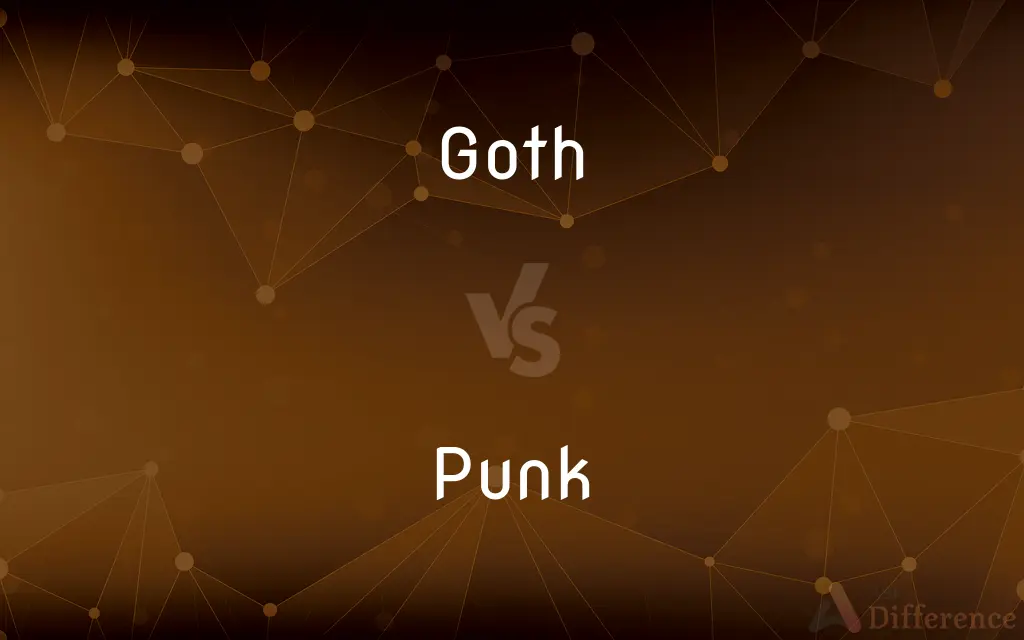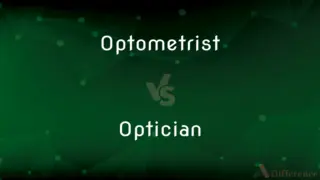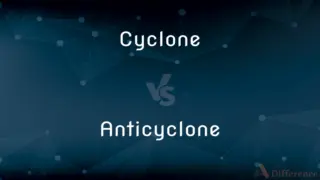Goth vs. Punk — What's the Difference?
Edited by Tayyaba Rehman — By Urooj Arif — Updated on March 25, 2024
Goth and punk are distinct subcultures; goth emphasizes dark aesthetics and introspection, while punk focuses on rebellion and anti-establishment attitudes.

Difference Between Goth and Punk
Table of Contents
ADVERTISEMENT
Key Differences
Goth and punk emerged as influential subcultures with distinct origins, aesthetics, and philosophies. The punk movement, originating in the 1970s, is characterized by its ethos of rebellion, anti-establishment views, and a DIY ethic, often reflected in aggressive music styles, minimalist fashion, and confrontational attitudes. Punks often sport colorful mohawks, studded leather jackets, and band T-shirts, using fashion as an extension of their rebellious message.
The goth subculture, which evolved in the late 1970s and early 1980s from the post-punk movement, delves into darker themes both aesthetically and philosophically. Goths are known for their dark, Victorian-inspired fashion, including black clothing, lace, and leather, complemented by distinctive makeup that typically features pale foundation and dark eyeliner. The goth subculture is heavily influenced by gothic literature and horror films, leading to a fascination with death, the supernatural, and the macabre.
Musically, punk is rooted in fast-paced, raw, and straightforward rock music. Punk lyrics often address political dissatisfaction, social injustices, and a desire for change. Goth music, however, tends to be more melodic and introspective, with a focus on complex emotions and romanticism. Bands like Bauhaus and The Cure are quintessential to the goth sound, often incorporating synthesizers and a wider range of musical influences.
While both subcultures value authenticity and individual expression, their manifestations and underlying philosophies differ significantly. Punk's aggressive push against societal norms contrasts with goth's more introspective and aesthetic approach to self-expression. Despite these differences, both movements have influenced broader culture and fashion, with their distinctive styles and ideologies continuing to attract followers worldwide.
The goth and punk subcultures also share some common ground, including a sense of community among their members and a penchant for challenging mainstream cultural norms. However, the means and motivations behind their expressions of identity and community differ, reflecting their unique historical contexts and core values.
ADVERTISEMENT
Comparison Chart
Origins
Late 1970s, evolving from post-punk
Mid-1970s, emerging as a music and cultural movement
Fashion
Dark, Victorian-inspired, makeup emphasizing pallor
DIY, rebellious, often includes mohawks, leather, studs
Music
Melodic, introspective, with themes of romance and melancholy
Fast-paced, aggressive, with themes of rebellion and social critique
Themes
Fascination with death, supernatural, and the macabre
Anti-establishment, political dissatisfaction, desire for change
Philosophical Underpinnings
Romanticism, introspection, aestheticism
Rebellion, DIY ethic, anti-authoritarianism
Compare with Definitions
Goth
A subculture known for its dark, Victorian-influenced fashion and introspective music.
She embraced the goth subculture, attending clubs in elaborate Victorian dresses and dark makeup.
Punk
A subculture that emerged as a reaction against mainstream music and societal norms.
Punk's raw energy was a response to the perceived stagnation in rock music and social unrest in the 1970s.
Goth
Emphasizes individual expression and a close-knit community.
The goth community often gathers at specialized events, celebrating their shared aesthetic and musical interests.
Punk
Music is fast-paced, raw, and direct, often addressing social and political issues.
The Ramones and The Clash are iconic punk bands, known for their straightforward, hard-hitting songs.
Goth
Often associated with themes of death, the supernatural, and romanticism.
Goth literature, with its focus on the macabre, greatly influences the subculture's aesthetics and themes.
Punk
Known for its DIY ethic and minimalist, rebellious fashion.
Punks often create their own clothing, featuring band patches, studs, and ripped fabrics to express their individuality and defiance.
Goth
Music characterized by melodic, somber tones and introspective lyrics.
Bands like Siouxsie and the Banshees epitomize the goth music scene with their dark, poetic sound.
Punk
Values authenticity, anti-establishment attitudes, and community.
Punks unite in their shared disdain for societal norms and commercialism, often supporting underground music scenes and independent venues.
Goth
Distinctive for its use of dark makeup and pale foundation.
Goth fashion includes heavy, dark eyeliner and pale foundation, contributing to its ethereal aesthetic.
Punk
Punk fashion includes elements like mohawks, leather jackets, and body piercings.
Punk fashion is deliberately confrontational, using elements like studded leather jackets and brightly colored mohawks to challenge conventional aesthetics.
Goth
A member of a Germanic people who invaded the Roman Empire in the early centuries of the Christian era.
Punk
A loud, fast-moving, and aggressive form of rock music, popular in the late 1970s
Punk had turned pop music and its attendant culture on its head
Goth
A style of rock music, noted especially for somber or ethereal tones and lugubrious lyrics.
Punk
A worthless person (often used as a general term of abuse)
You think any of these punks they got fighting today could stand up to Joe Louis?
Goth
A performer or follower of this style of music.
Punk
Soft, crumbly wood that has been attacked by fungus, used as tinder.
Goth
(uncountable) A punk-derived subculture of people who predominantly dress in black, associated with mournful music and attitudes.
Philip has been into goth for many years, haven't you dear?
Punk
Relating to punk rock and its associated subculture
A punk band
A punk haircut
Goth
A style of punk rock influenced by glam rock; gothic rock.
Punk
In poor condition
I felt too punk to eat
Goth
(countable) A person who is part of the goth subculture.
We saw a solitary goth hanging out on a ledge by the train station.
Punk
Trick or deceive
His friends punked him and told him that she was having a party, which is why he showed up unannounced
The Associated Press got punked with a fake tweet
Goth
Relating to goth music or people.
With her black clothes and dyed hair, Melanie looked very goth compared to her classmates.
Punk
An often aggressive or violent young person
The building was set on fire by a bunch of punks.
Goth
One of an ancient Teutonic race, who dwelt between the Elbe and the Vistula in the early part of the Christian era, and who overran and took an important part in subverting the Roman empire.
Punk
An inexperienced young person
We don't want that little punk tagging along.
Goth
One who is rude or uncivilized; a barbarian; a rude, ignorant person.
Punk
A cowardly or weak young person
Don't let him disrespect you—show him you're not a punk.
Goth
A crude uncouth ill-bred person lacking culture or refinement
Punk
Punk rock.
Goth
One of the Teutonic people who invaded the Roman Empire in the 3rd to 5th centuries
Punk
A punk rocker.
Punk
(Archaic) A prostitute.
Punk
Dry decayed wood, used as tinder.
Punk
Any of various substances that smolder when ignited, used to light fireworks.
Punk
Chinese incense.
Punk
To act in a cowardly manner. Often used with out.
Punk
To humiliate (someone). Often used with down or out.
Punk
To dupe or deceive.
Punk
To play a practical joke on.
Punk
Of poor quality; worthless.
Punk
Weak in spirits or health.
Punk
A worthless person, particularly:
Punk
Syn of fellow: any person, especially a male comrade.
Punk
(pejorative) A petty criminal, especially a juvenile delinquent.
Punk
(pejorative) sissy: a weak, timid person.
Punk
Syn of amateur.
Punk
A young, untrained animal or worker.
Punk
, a genre known for short, loud, energetic songs with electric guitars and strong drums.
Punk
(countable) nodot=a, a musician known for playing punk rock or a fan of the genre.
Punk
(uncountable) The larger nonconformist social movement associated with punk rock and its fans.
Punk
(uncountable) Any material used as tinder for lighting fires, such as agaric, dried wood, or touchwood, but especially wood altered by certain fungi.
Punk
(countable) A utensil for lighting wicks or fuses (such as those of fireworks) resembling stick incense.
Punk
Worthless, contemptible, particularly
Punk
Bad, substandard.
Punk
Thuggish, criminal.
Punk
Cowardly.
Punk
Poorly, sickly.
Punk
Inexperienced.
Punk
Of or concerning punk rock or its associated subculture.
You look very punk with your t-shirt, piercing, and chains.
Punk
(slang) To pimp.
Punk
To prank.
I got expelled when I punked the principal.
Punk
(especially with "out") To give up or concede; to act like a wimp.
Jimmy was going to help me with the prank, but he punked (out) at the last minute.
Punk
To adapt or embellish in the style of the punk movement.
Punk
Wood so decayed as to be dry, crumbly, and useful for tinder; touchwood.
Punk
A fungus (Polyporus fomentarius, etc.) sometimes dried for tinder; agaric.
Punk
An artificial tinder. See Amadou, and Spunk.
Punk
A prostitute; a strumpet.
Punk
An aggressive and violent young criminal
Punk
Substance that smolders when ignited; used to light fuses (especially fireworks)
Punk
Material for starting a fire
Punk
A teenager or young adult who is a performer (or enthusiast) of punk rock and a member of the punk youth subculture
Punk
Rock music with deliberately offensive lyrics expressing anger and social alienation; in part a reaction against progressive rock
Punk
Of very poor quality
Common Curiosities
Can goth and punk overlap?
While goth and punk are distinct, individuals may find elements of both that resonate with them, leading to overlap in music tastes, fashion, or ideology.
What is the significance of fashion in goth and punk subcultures?
Fashion plays a key role in both subcultures as a form of self-expression and identity, with goth fashion emphasizing dark, romantic aesthetics and punk fashion highlighting rebellion and DIY creativity.
What are the core values of punk?
Punk is defined by its values of rebellion, anti-establishment attitudes, DIY ethics, and a direct, aggressive approach to music and fashion.
What are the historical origins of the goth and punk subcultures?
The punk subculture originated in the mid-1970s as a response to social unrest and the perceived complacency of mainstream rock music. The goth subculture emerged in the late 1970s and early 1980s, evolving from the post-punk movement with influences from gothic literature and film.
How do goth and punk music differ?
Goth music tends to be melodic and introspective, often exploring themes of romance and melancholy, while punk music is fast-paced, raw, and focused on rebellion and critique.
What defines the goth subculture?
The goth subculture is characterized by its dark, romantic aesthetic, fascination with the macabre, and introspective music and literature.
How has the punk ethos influenced wider society and culture?
The punk ethos of rebellion, anti-consumerism, and DIY has influenced various aspects of culture, including music production, fashion, and even political activism, encouraging a spirit of independence and resistance to authority.
Are goth and punk still relevant today?
Both subcultures continue to influence music, fashion, and popular culture, maintaining vibrant communities and evolving with new generations while staying true to their core philosophies.
How do goth and punk view mainstream culture?
Both subcultures typically position themselves in opposition to mainstream culture, though their reasons and methods of expression differ, with goths often focusing on aesthetic and emotional divergence, and punks on active rebellion and critique.
How do goth and punk subcultures express their musical preferences?
Punks prioritize music that is fast, loud, and rebellious, often attending live shows in underground venues and participating in the punk DIY music scene. Goths lean towards music that embodies dark, emotional, and often romantic themes, supporting bands and clubs that cater to these tastes.
Do goth and punk subcultures have a political dimension?
While not inherently political, both subcultures have elements that intersect with political ideas. Punk is more directly associated with political activism, particularly anarchism and anti-capitalism, while goth tends to be more apolitical, focusing on aesthetic and emotional expression.
Can individuals participate in both goth and punk subcultures?
Yes, individuals can and do participate in both subcultures, finding common ground in their shared values of authenticity, individual expression, and deviation from mainstream norms. The overlap is often seen in music preferences, fashion elements, and social venues.
How do goth and punk subcultures view commercialization?
Both subcultures generally disdain commercialization, valuing authenticity and underground culture. Punks explicitly resist commercial influences through a DIY approach to music and fashion, while goths maintain niche communities and events to preserve the integrity of their subculture.
What role do literature and film play in the goth subculture?
Gothic literature and horror films play a significant role in shaping the aesthetic and thematic elements of the goth subculture, influencing fashion, music, and art with their emphasis on the macabre, romanticism, and the supernatural.
How have goth and punk subcultures evolved over the years?
Both subcultures have evolved by incorporating elements from new music genres and cultural movements while retaining their core identities. The punk ethos has influenced newer genres like alternative rock and grunge, while goth has expanded to include subgenres like cybergoth and steampunk, reflecting changes in technology and aesthetic preferences.
Share Your Discovery

Previous Comparison
Optometrist vs. Optician
Next Comparison
Cyclone vs. AnticycloneAuthor Spotlight
Written by
Urooj ArifUrooj is a skilled content writer at Ask Difference, known for her exceptional ability to simplify complex topics into engaging and informative content. With a passion for research and a flair for clear, concise writing, she consistently delivers articles that resonate with our diverse audience.
Edited by
Tayyaba RehmanTayyaba Rehman is a distinguished writer, currently serving as a primary contributor to askdifference.com. As a researcher in semantics and etymology, Tayyaba's passion for the complexity of languages and their distinctions has found a perfect home on the platform. Tayyaba delves into the intricacies of language, distinguishing between commonly confused words and phrases, thereby providing clarity for readers worldwide.














































